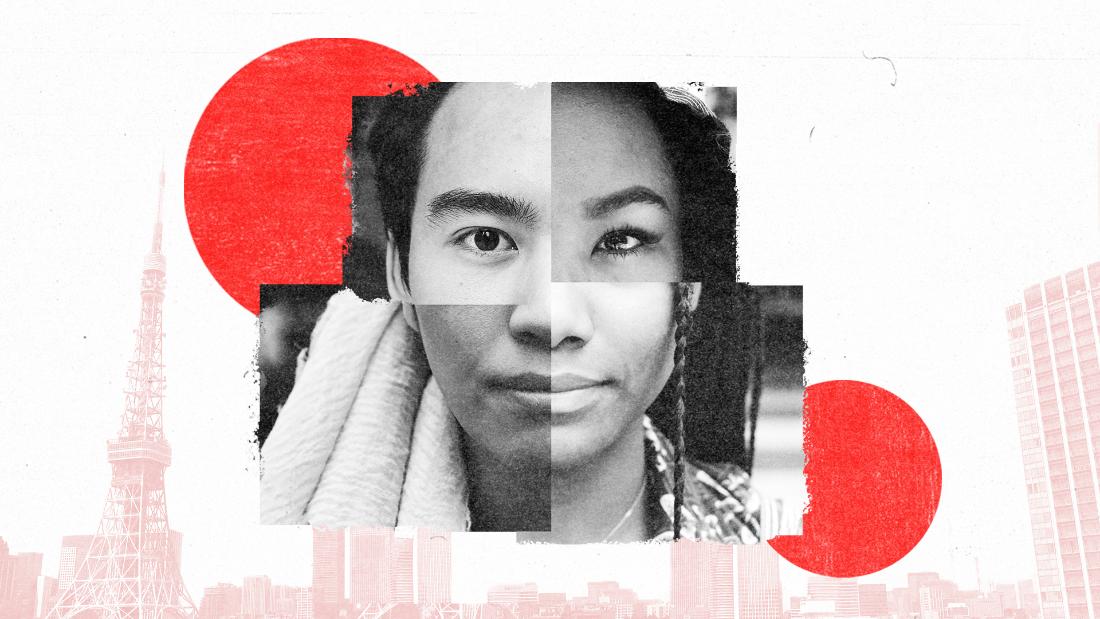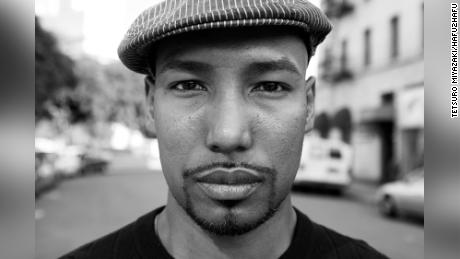Anna, a woman of mixed Japanese and American heritage, was in a taxi en route to a party in Tokyo last year when she was asked that question, and says she had half expected it.
Anna, who requested anonymity for privacy reasons, has a Japanese mother and a White American father, and spent her childhood in Japan, before moving to the US in her teens.
“I don’t know how many hours I’ve spent telling my life story to strangers who want to fulfill their curiosity,” says Anna. “It was getting to a point where I thought, Why do I need to share my biological background with someone I’m never going to meet again?”
In some cases, that’s not a bad thing.
Many mixed heritage entertainers and sports stars are hugely popular in Japan. Well-known figures such as Vogue model Rina Fukushi and tennis star Naomi Osaka have given mixed heritage people more prominence in the public sphere in Japan, and globally.
For others, however, the apparent fascination with their heritage brings unwanted attention and can invite casual racism. Some who consider themselves Japanese say it leaves them feeling othered in their own country.
Mixed heritage
Mixed-race identity has a complex history in Japan.
Between 1639 and 1853, Japan closed its borders to foreign influence — with the exception of Chinese and Dutch traders who came to the port cities of Yokohama and Nagasaki.
“Back then, there was a lot of debate over whether to assimilate or keep apart these children when they entered elementary school,” says Lawrence Yoshitaka Shimoji, a sociologist at Ritsumeikan University in Japan.
A changing world
As Japan absorbed Western influences in the post-World War II years, perceptions changed.
European languages were seen as chic and exotic and Japan’s fascination with Western movie stars grew.
Spying an opportunity, Japanese management companies started to promote local actors, dancers and singers of mixed heritage, says Okamura, the independent scholar.
By then, the derogatory term of konketsuji had given way to “hafu,” a corruption of the word “half-caste”. In 1973, its use was formalized in the 1973 edition of a dictionary called Kanazawa Shōzaburō’s Kōjirin or “Wide Forest of Words,” where it was listed as a synonym of konketsuji.
Rather than unite the population, the buzz around “hafu” created an “us and them” mentality, says Okamura. Mixed heritage people who look more foreign than Japanese may be treated as foreigners, he added, even if they are Japanese nationals.
That’s not always welcome.
Immigration
The fascination with mixed heritage Japanese people can also be traced to the country’s lack of immigration.
It represented a major shift in Japan’s approach to immigration.
However, the change didn’t go far enough, according to Jeff Kingston, a Japan expert from Temple University. He said the roles would be filled by migrant laborers who would be expected to leave Japan one day.
Despite the barriers, Japan’s demographics are slowly changing. In 2019, one in 30 babies born in Japan had a non-Japanese parent compared to 1 out of 50 babies three decades ago, according to the Ministry of Health, Labor and Welfare.
While ethnic Ryukyuans, Japanese-Koreans, Japanese-Chinese and Japanese-Brazilians, among other mixed heritage people, are part of society often that diversity isn’t reflected in the population figures.
Japan’s constitution stipulates that all citizens are equal under the law and granted fundamental human rights. At schools, teachers educate children on these topics, but the ideas have not properly taken root in the country, says Okamura, the independent scholar.
For instance, sometimes Japanese-Chinese or Japanese-Koreans, who are referred to as “invisible hafu” can face discrimination when they own up to their non-Japanese ethnic background, says Shimoji.
And others who have darker skin can receive unwanted attention.
Measuring equality
David Yano, a half-Japanese and half-Ghanaian man, has lived in Japan for over 20 years. He has appeared on television shows to talk about his experiences growing up in the country.
It hasn’t always been easy. Yano says he was bullied for looking different at school. When he started appearing as a cultural commentator on TV, his agents recommended he play into the stereotypes of Black people as being funny and try to make it as a comedian.
Yano says he’s been stopped by police in Tokyo’s Shinjuku ward and has faced discrimination when trying to rent a home. He says estate agents have told him that landlords have rejected his tenancy applications based on his skin color. “They don’t take time to find out about my background. Instead, they worry about what other tenants will think,” says Yano.
“Japanese (mixed heritage) people are experiencing racism, but as they are Japanese, they aren’t included in surveys that would highlight that issue,” says Shimoji, the sociologist.
Yano is now the founder of Enijie, a nonprofit that promotes education and ties between Ghana and Japan. He thinks Japan is slowly changing as more people become open to questioning their biases and assumptions about what it means to be Japanese.
He’s one of a number of people who are trying to expand mindsets in Japan.
Subjects of discussion include tackling stereotypes of hafu where they are presumed to be everything from bilingual to “disappointing,” if they are unattractive, not bilingual and from a non-White parent.
Last year, Anna made small “meeting cards” to give to nosy Japanese strangers. That card includes information on everything from which one of her parents is Japanese and American to whether her eyelashes are real or fake. It also states that it’s rude to ask someone you’ve just met personal questions about their race and appearance.
So far, Anna has handed out around 15 cards. A man in his sixties assumed Anna was a foreigner and commented on her decision to buy a typical Japanese dish topped with grated yams at a convenience store. He angrily threw the card back at her when she gave it to him. Another woman said she thought Anna would take her comments on her looks as a compliment. She asked if she could keep the card to show her husband.
Labels aside
“Around my group of friends daburu is not that popular. We’re not upset we’re hafu; we’re upset that people think we’re different,” says Anna. “I prefer the term “mikusu” (mixed) because it involves more people, but I’d just prefer not to be called anything.”
Labels aside, she says Japan isn’t keeping up-to-date with the debates on racial equality happening elsewhere.
For instance, in 2018, Naomi Osaka’s victory in the 2018 US Open tennis tournament triggered an intense discussion on what it means to be Japanese on social media, with users praising Osaka for her Japanese win. Osaka’s heritage spans Japan, Haiti and the US.
Some were quick to point out the double standards.
After Anna’s meeting card went viral on Twitter, she received messages from mixed heritage Japanese children who asked her for advice on how to deal with bullies at school. She felt like the conversation hadn’t moved on since she was in third grade and being bullied for looking different.
To shift mindsets, Anna wants influential hafu people in the public eye to talk about the negative discrimination they experienced before fame. Politicians, popular CEOs and entertainers who endorse multiculturalism need to tell people that casual racism is hurtful and offensive, she says.
As for her meeting card, Anna thinks the attention it sparked is positive.
“The fact that people talked about this card is a small but big change. In that sense, I feel there has been change and there is room for change in the next coming years,” says Anna. “But unless something dramatic happens, it won’t be enough.”
CNN’s Yoko Wakatsuki contributed to this report from Tokyo.



